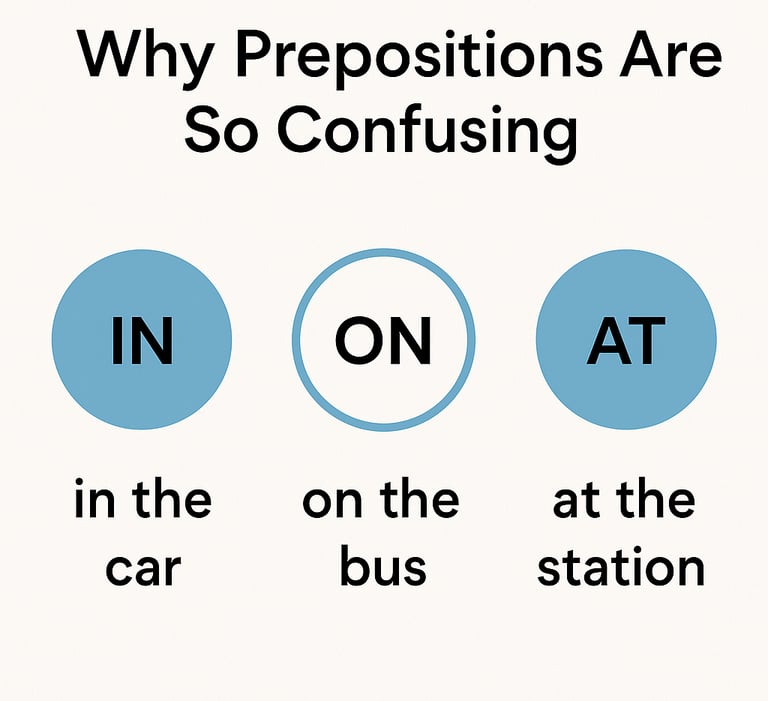The Puzzle Called Prepositions
Why Prepositions Are So Confusing
GIST Masterclass
8/6/20252 min temps de lecture


Introduction
Prepositions are tiny words with a mighty impact. They connect nouns, pronouns, and phrases to the rest of the sentence, creating relationships of time, place, direction, cause, and manner. Words like in, on, at, with, by, and about look harmless, yet they can twist the meaning of a sentence in subtle and sometimes surprising ways. For language learners, prepositions often feel like a puzzle where the pieces do not always fit logically.
Why Are Prepositions So Difficult?
Prepositions are tricky because they rarely follow strict rules. Unlike verbs that can be conjugated or nouns that can be pluralized, prepositions often depend on convention and context.
No one-to-one translation. A French learner might wonder why we say on the bus but in the car, or why we are interested in something but good at something else.
Idiomatic usage. Prepositions appear in fixed phrases: we say by heart, at risk, under pressure. Change the preposition, and the meaning collapses.
Multiple meanings. A single preposition can serve many functions. Consider on: on Monday (time), on the table (place), on sale (status).
Silent rules. Native speakers use them intuitively, but learners often struggle to explain why something is correct.
This complexity makes prepositions one of the last hurdles even advanced learners face.
How Learners Can Self-Learn Prepositions
Mastering prepositions is not about memorizing endless rules. It is about exposure, practice, and pattern recognition. Here are strategies you can use to self-learn:
Notice Patterns, Not Rules
Instead of trying to justify at night but in the morning, focus on observing how prepositions are naturally used in authentic materials. Patterns reveal more than grammar charts.Chunk Learning
Prepositions often appear as part of a “chunk” of language. Fixed expressions like afraid of, depend on, or in charge of should be learned as vocabulary items, not isolated words.Keep a Preposition Journal
Every time you encounter an expression with a preposition, write it down in context. Example: She insisted on paying. Over time, you will build your personal reference list.Compare Languages Carefully
Translation can mislead. Instead, focus on English usage in real contexts. For instance, in English we say listen to music, whereas in some languages no preposition is required.Practice with Real Materials
Songs, news articles, and podcasts are rich sources. Highlight prepositional phrases and practice reusing them in your own sentences.Test Yourself with Mini-Games
Create fill-in-the-blank exercises with the prepositions you have collected. Example: “He is good ___ playing chess.” (Answer: at).
10 Advanced Preposition Test Items
Here is a self-study test you can copy to MicroSoft Word and try using the right preposition. After you finish, paste the test back into ChatGPT and use the following prompt: “Show the correct answers.” That way, you can check and learn instantly.
Test: Fill in the blanks with the correct preposition.
She accused him ___ breaking the contract.
The professor specializes ___ postcolonial literature.
He was praised ___ his quick response to the crisis.
They congratulated her ___ winning the international award.
The new regulations will come ___ effect next month.
He insisted ___ paying the entire bill despite our objections.
The politician was removed ___ office after the scandal.
Many cultures differ significantly ___ their views on personal space.
She succeeded ___ convincing the board to approve her proposal.
He is notorious ___ avoiding responsibility whenever problems arise.
Conclusion
Prepositions may feel like a puzzle, but unlike a jigsaw, there is not one final picture. Mastery comes from recognizing recurring pieces and seeing how they connect in different contexts. By approaching them as patterns rather than rules, you transform confusion into clarity. Prepositions stop being barriers and become bridges, the small words that carry big meaning.
